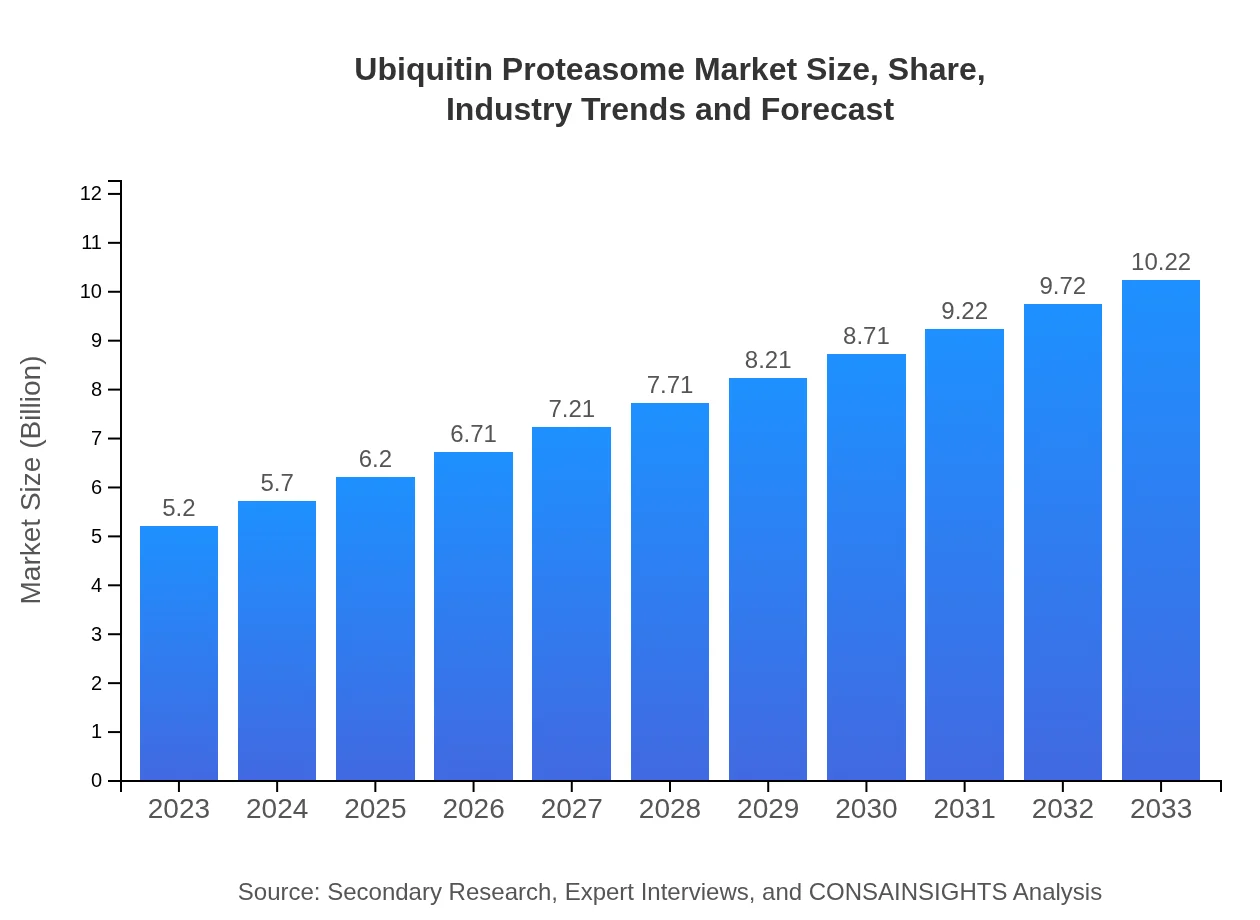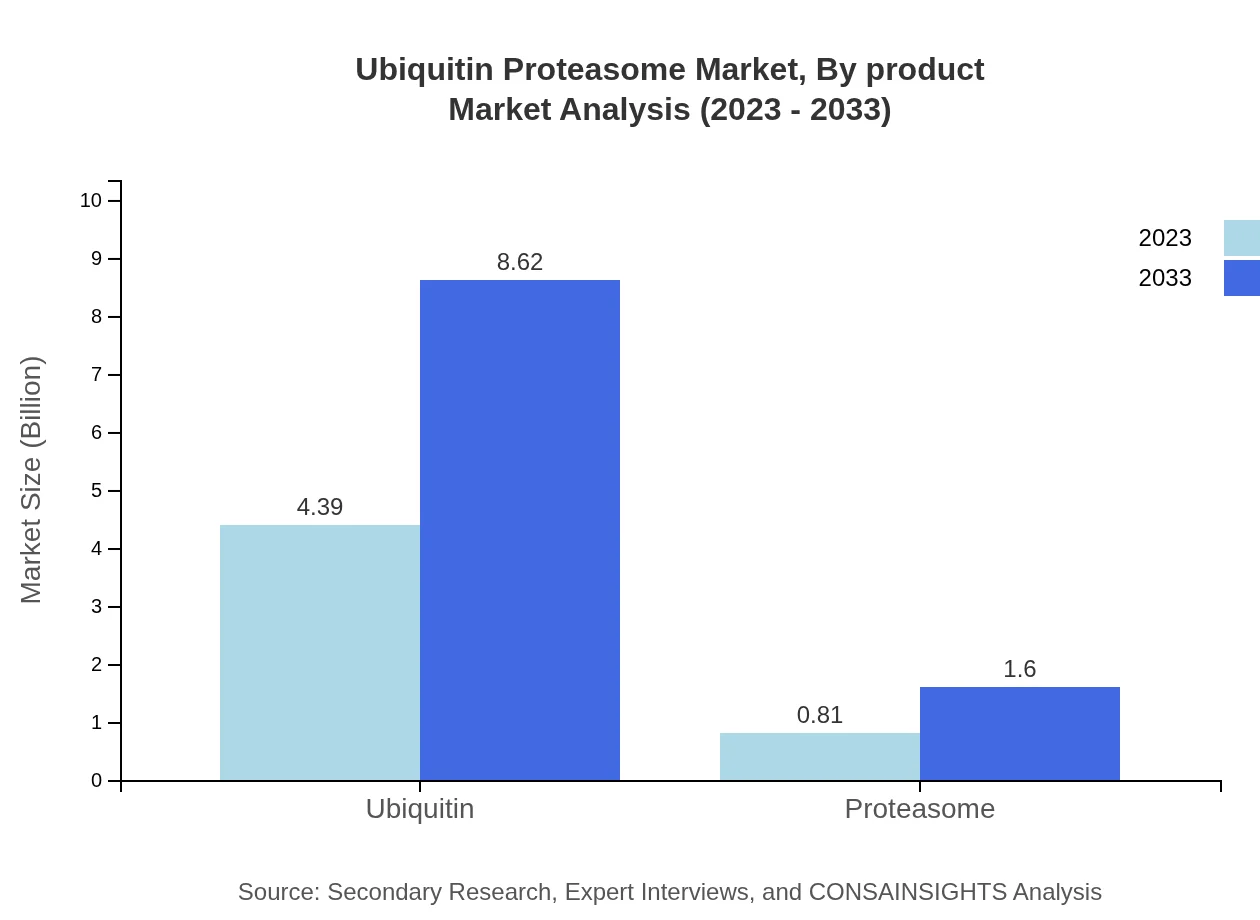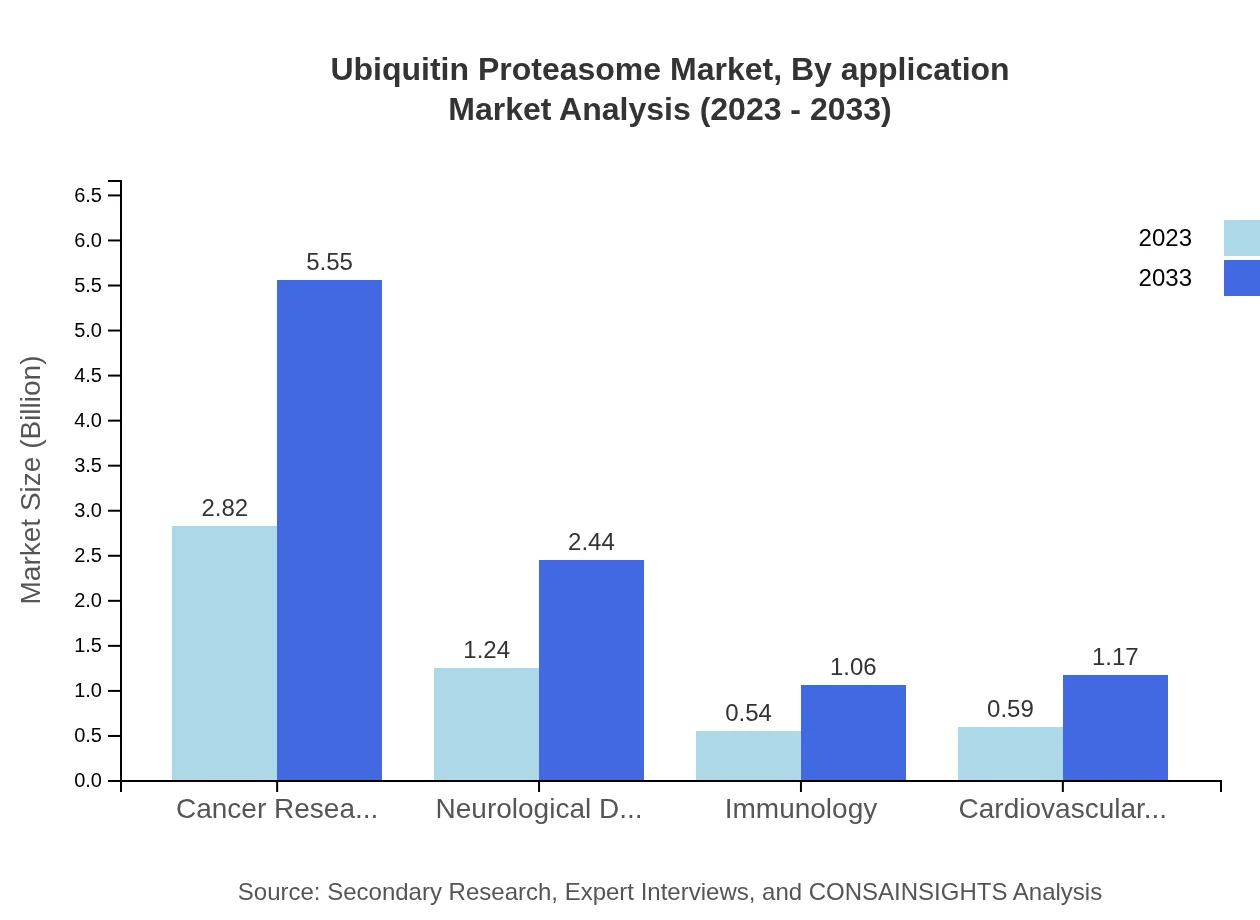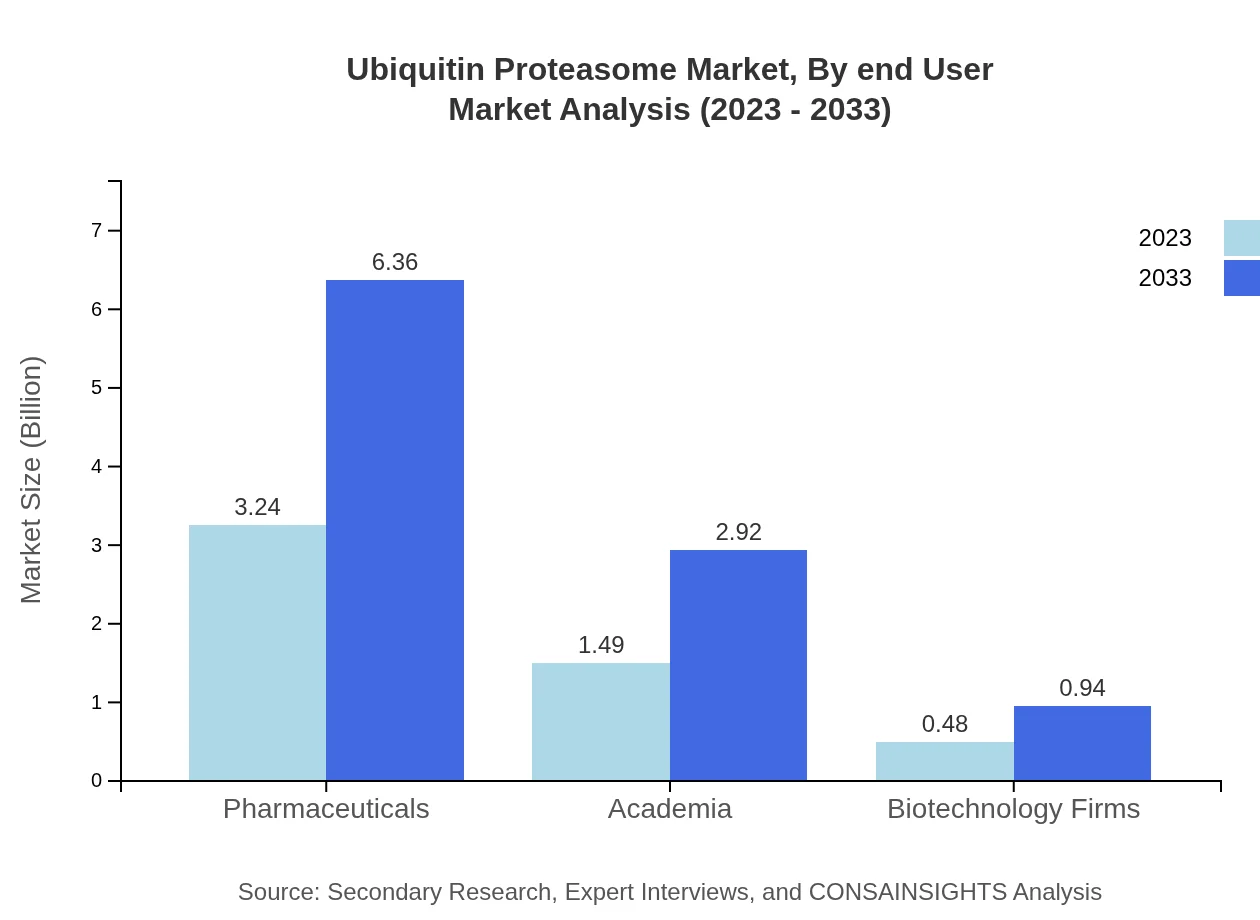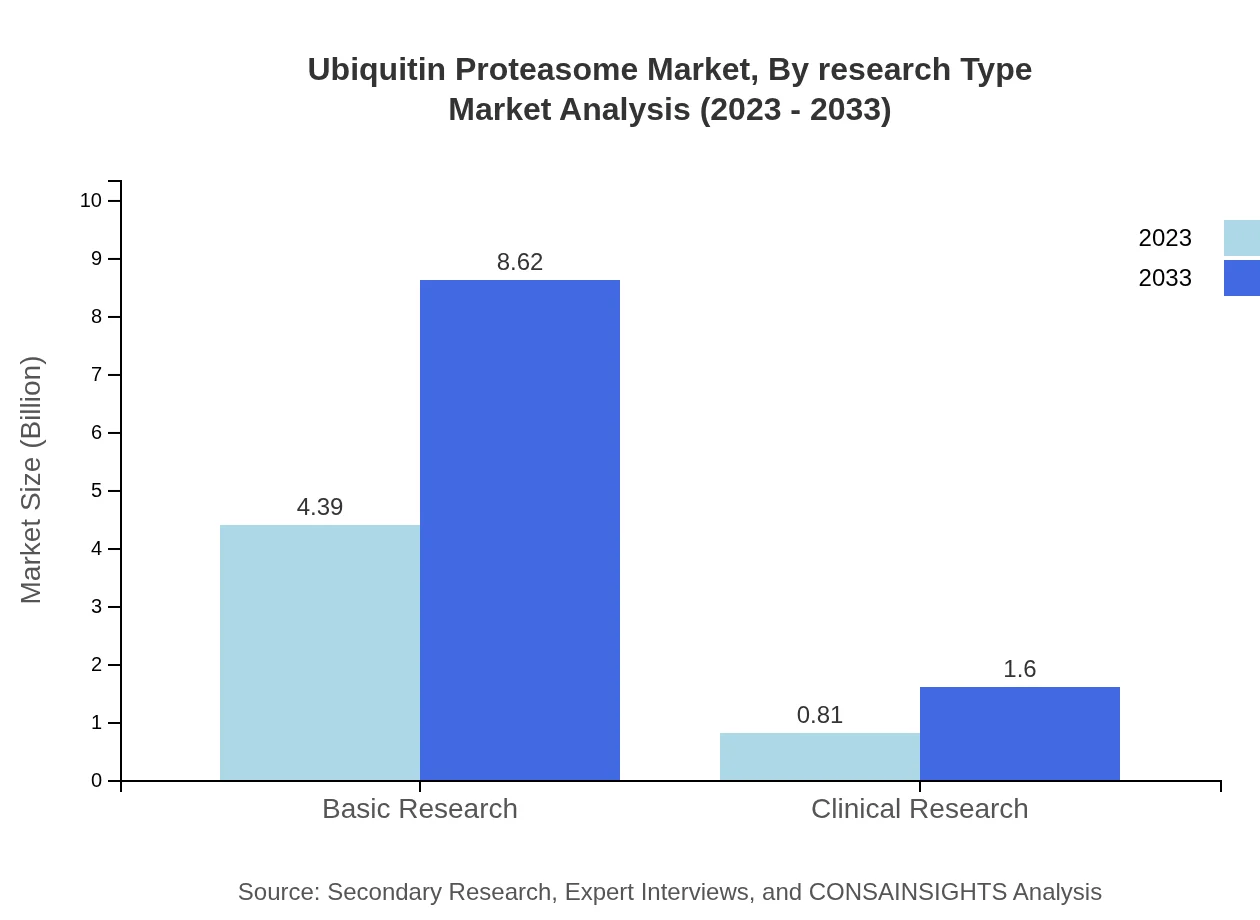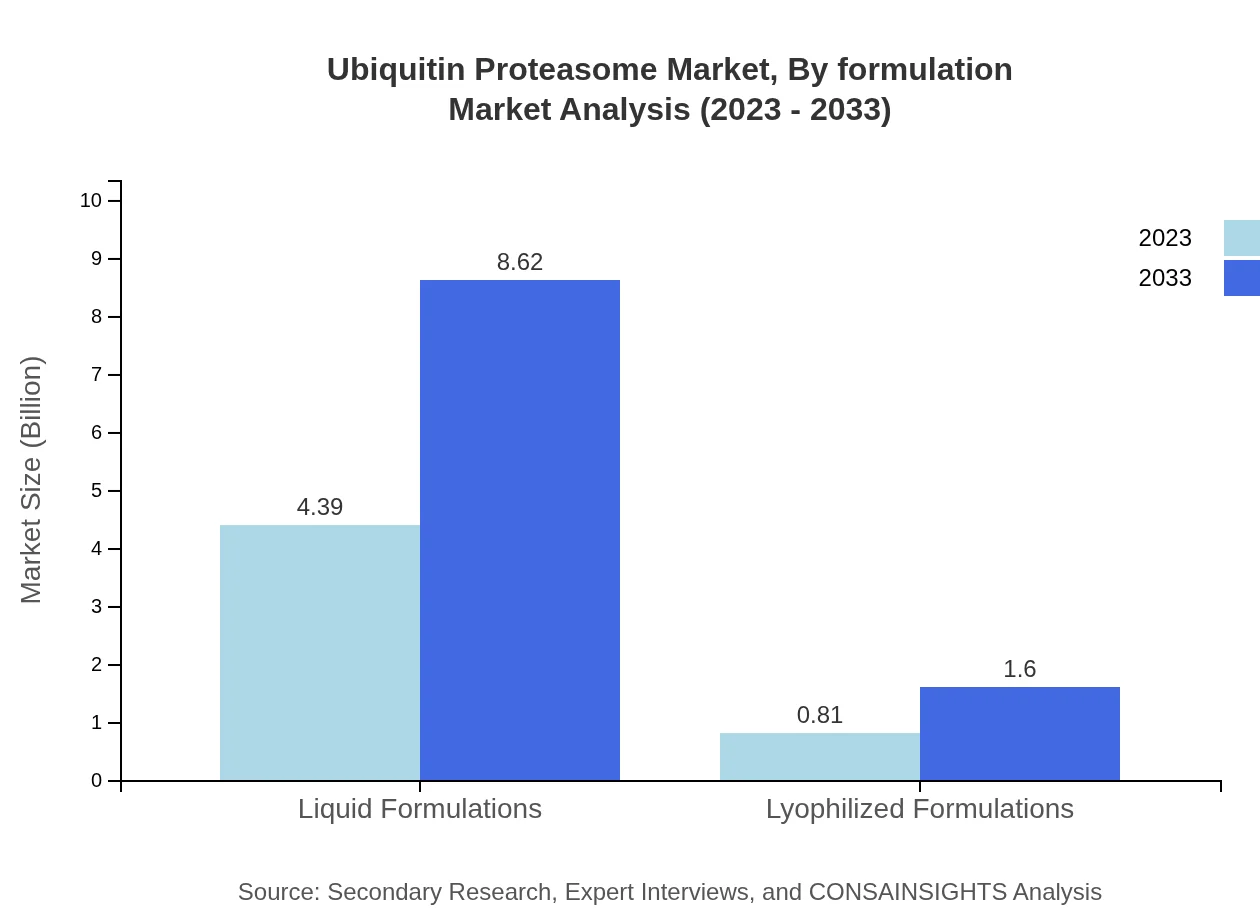Ubiquitin Proteasome Market Report
Published Date: 31 January 2026 | Report Code: ubiquitin-proteasome
Ubiquitin Proteasome Market Size, Share, Industry Trends and Forecast to 2033
This report provides an in-depth analysis of the Ubiquitin Proteasome market, focusing on critical insights and data from 2023 to 2033. It encompasses market size, growth trends, regional analyses, and comprehensive assessments of key segments and players in the industry.
| Metric | Value |
|---|---|
| Study Period | 2023 - 2033 |
| 2023 Market Size | $5.20 Billion |
| CAGR (2023-2033) | 6.8% |
| 2033 Market Size | $10.22 Billion |
| Top Companies | Amgen Inc., Bristol-Myers Squibb, Novartis, Roche, Takeda Pharmaceutical Company |
| Last Modified Date | 31 January 2026 |
Ubiquitin Proteasome Market Overview
Customize Ubiquitin Proteasome Market Report market research report
- ✔ Get in-depth analysis of Ubiquitin Proteasome market size, growth, and forecasts.
- ✔ Understand Ubiquitin Proteasome's regional dynamics and industry-specific trends.
- ✔ Identify potential applications, end-user demand, and growth segments in Ubiquitin Proteasome
What is the Market Size & CAGR of Ubiquitin Proteasome market in 2033?
Ubiquitin Proteasome Industry Analysis
Ubiquitin Proteasome Market Segmentation and Scope
Tell us your focus area and get a customized research report.
Ubiquitin Proteasome Market Analysis Report by Region
Europe Ubiquitin Proteasome Market Report:
The European Ubiquitin Proteasome market is anticipated to escalate from $1.25 billion in 2023 to $2.45 billion by 2033. Europe benefits from strong regulatory frameworks supporting drug development and extensive research programs at academic institutions.Asia Pacific Ubiquitin Proteasome Market Report:
The Asia Pacific region is projected to witness significant growth with a market size expected to reach $2.18 billion by 2033, up from $1.11 billion in 2023. This growth is supported by increasing healthcare investments, a rise in biopharmaceutical production, and an expanding patient population in countries like China and India.North America Ubiquitin Proteasome Market Report:
North America holds a significant portion of the market, projected to grow from $1.75 billion in 2023 to $3.44 billion by 2033. The region's growth is attributed to the concentration of major biopharmaceutical companies, robust research funding, and a high prevalence of chronic diseases.South America Ubiquitin Proteasome Market Report:
In South America, the market is estimated to expand from $0.40 billion in 2023 to $0.79 billion in 2033. Factors such as improving healthcare infrastructure and growing awareness of advanced research technologies are likely to fuel this growth in the region.Middle East & Africa Ubiquitin Proteasome Market Report:
The Middle East and Africa region is expected to reach a market size of $1.36 billion by 2033, growing from $0.69 billion in 2023. This growth is driven by increasing pharmaceutical investments and rising healthcare demands in various countries within this region.Tell us your focus area and get a customized research report.
Ubiquitin Proteasome Market Analysis By Product
The Ubiquitin Proteasome market is primarily driven by the dominance of ubquitin and proteasome products. In 2023, Ubiquitin's market size is approximately $4.39 billion with a projected increase to $8.62 billion by 2033, maintaining an impressive 84.35% market share. In contrast, proteasome products show a smaller footprint, growing from $0.81 billion to $1.60 billion, comprising around 15.65% of the market.
Ubiquitin Proteasome Market Analysis By Application
Different applications concerning Ubiquitin Proteasome include pharmaceuticals, academia, and various therapeutic sectors. Pharmaceuticals represent a substantial market share with a projected size increase from $3.24 billion in 2023 to $6.36 billion by 2033, marking a consistent 62.27% share across the forecast period. Academia also contributes significantly, expanding from $1.49 billion to $2.92 billion, with a steady 28.58% market share.
Ubiquitin Proteasome Market Analysis By End User
The end-user segment encompasses cancer research, neurological disorders, and immunology among others. Cancer research leads the segment with a market size of $2.82 billion in 2023 expected to reach $5.55 billion by 2033, holding a share of 54.28% throughout the period. Neurological disorders and immunology are also critical, reflecting market sizes of $1.24 billion to $2.44 billion and $0.54 billion to $1.06 billion, respectively.
Ubiquitin Proteasome Market Analysis By Research Type
The market exhibits strong application in both basic and clinical research. Basic research leads with a market increase from $4.39 billion in 2023 to $8.62 billion in 2033, maintaining an impressive share of 84.35%. Clinical research, while smaller, grows from $0.81 billion to $1.60 billion, holding a 15.65% share.
Ubiquitin Proteasome Market Analysis By Formulation
Formulation types in this market include liquid and lyophilized formulations. Liquid formulations dominate the market, projected to grow from $4.39 billion to $8.62 billion, while lyophilized formulations are expected to expand modestly from $0.81 billion to $1.60 billion, indicating their specialized but important role in research and therapeutic applications.
Ubiquitin Proteasome Market Trends and Future Forecast
Tell us your focus area and get a customized research report.
Global Market Leaders and Top Companies in Ubiquitin Proteasome Industry
Amgen Inc.:
A leading biotechnology company known for its innovative approaches to drug development, particularly in the cell signaling domain, including the ubiquitin-proteasome system.Bristol-Myers Squibb:
A global biopharmaceutical company that has made significant advancements in developing therapies targeting the ubiquitin-proteasome pathway, particularly for oncology.Novartis:
A major player in pharmaceuticals with a focus on innovative treatments including proteasome inhibitors that play a crucial role in cancer therapy.Roche:
A leader in pharmaceuticals and diagnostics, engaged in research driven by proteasome biology to enhance cancer treatment methodologies.Takeda Pharmaceutical Company:
A key contributor to advancing cancer therapies based on targeting the proteasome, focusing on improving treatment outcomes and novel drug development.We're grateful to work with incredible clients.









FAQs
What is the market size of ubiquitin Proteasome?
The ubiquitin-proteasome market is projected to reach a size of $5.2 billion by 2033, growing at a CAGR of 6.8%. This growth reflects increasing investments in research and advancements in therapeutic applications.
What are the key market players or companies in this ubiquitin Proteasome industry?
Key players include companies involved in pharmaceuticals and biotechnology. These companies are pivotal in driving innovation in the ubiquitin-proteasome pathway, focusing on new drug developments and therapies, which directly impacts the market dynamics.
What are the primary factors driving the growth in the ubiquitin Proteasome industry?
The growth is primarily driven by advancements in cancer research and treatment technologies, increased funding in drug discovery, and a surge in demands for effective therapeutic solutions targeting neurological disorders and immunology.
Which region is the fastest Growing in the ubiquitin Proteasome?
The North American region is the fastest-growing market for ubiquitin-proteasome technologies, forecasted to grow from $1.75 billion in 2023 to $3.44 billion by 2033, reflecting a strong research and healthcare infrastructure.
Does ConsaInsights provide customized market report data for the ubiquitin Proteasome industry?
Yes, ConsaInsights offers customized report data tailored to client needs in the ubiquitin-proteasome sector. Clients can expect tailored insights that focus on specific interests, enhancing decision-making.
What deliverables can I expect from this ubiquitin Proteasome market research project?
Deliverables include comprehensive market analysis reports, regional breakdowns, competitive landscape summaries, and forecasts, among others. This information is vital for strategic planning and investment.
What are the market trends of ubiquitin Proteasome?
Current market trends indicate a high focus on liquid formulations in research applications. The market for liquid formulations is projected to grow from $4.39 billion in 2023 to $8.62 billion by 2033, signifying innovation in drug delivery.

